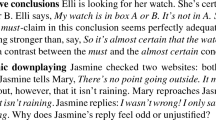Abstract
The article focuses on representing different forms of non-adjunctive inference as sub-Kripkean systems of classical modal logic, where the inference from □A and □B to □A∧B fails. In particular we prove a completeness result showing that the modal system that Schotch and Jennings derive from a form of non-adjunctive inference in (Schotch and Jennings, 1980) is a classical system strictly stronger than EMN and weaker than K (following the notation for classical modalities presented in Chellas, 1980). The unified semantical characterization in terms of neighborhoods permits comparisons between different forms of non-adjunctive inference. For example, we show that the non-adjunctive logic proposed in (Schotch and Jennings, 1980) is not adequate in general for representing the logic of high probability operators. An alternative interpretation of the forcing relation of Schotch and Jennings is derived from the proposed unified semantics and utilized in order to propose a more fine-grained measure of epistemic coherence than the one presented in (Schotch and Jennings, 1980). Finally we propose a syntactic translation of the purely implicative part of Jaśkowski's system D2 into a classical system preserving all the theorems (and non-theorems) explicilty mentioned in (Jaśkowski, 1969). The translation method can be used in order to develop epistemic semantics for a larger class of non-adjunctive (discursive) logics than the ones historically investigated by Jaśkowski.
Similar content being viewed by others
References
Arló-Costa, H. (2002) First order extensions of classical systems of modal logic: The role of the Barcan schemas, Studia Logica 71, 87–118.
Barwise, J. (1988) Three views of common knowledge, TARK II, 365–379.
Barwise, J. and Moss, L. (1996) Vicious Circles: On the Mathematics of Non-Wellfounded Phenomena, CSLI Publications, February.
Chellas, B. F. (1980) Modal Logic: An Introduction, Cambridge University Press, Cambridge.
da Costa, N. C. A. and Dubikajtis, L. (1977) On Jaśkowski's discussive logic, in A. I. Arruda, N. C. A. da Costa and R. Chuaqui (eds.), Non-Classical Logics, Model Theory and Computability, North-Holland Publishing Company.
Halpern, J. Y. and Rabin, M. O. (1987) A logic to reason about likelihood, Artificial Intelligence 32, 379–405.
Hintikka, J. (1962) Knowledge and Belief: An Introduction to the Logic of the Two Notions, Cornell University Press, Ithaca and London.
Jaśkowski, S. (1948) Rachunek zdań dla systemów dedukcyjnych sprzecznych, Studia Societatis Scientiarum Torunensis, Section A 1(5), 57–77.
Jaśkowski, S. (1969) Propositional calculus for contradictory deductive systems, Studia Logica XXIV, 143–157.
Kyburg, H. E., Jr. (1961) Probability and the Logic of Rational Belief, Wesleyan University Press, Middletown.
Kyburg, H. E., Jr. (1997) The rule of Adjunction and reasonable inference, J. Philosophy, March.
Kyburg, H. E., Jr. and Teng, C. M. (2002) The logic of risky knowledge, in Proceedings of WoLLIC, Brazil.
Kolmogorov, A. N. (1924) O principie tertium non datur, Mat. Sbornik 32.
Montague, R. (1970) Universal grammar, Theoria 36, 373–398.
Priest, G. and Tanaka, K. (2000) Paraconsistent Logic, Stanford Encyclopedia of Philosophy, http://plato.stanford.edu/entries/logic-paraconsistent/, December 6.
Schotch, P. K. and Jennings, R.E. (1980) Inference and necessity, J. Philos. Logic 9, 327–340.
Segerberg, K. (1971) An Essay in Classical Modal Logic, Stockholm.
Scott, D. (1970) Advice in modal logic, in Lambert, K. (ed.), Philosophical Problems in Logic, Reidel, Dordrecht, pp. 143–173.
Urchs, M. (1995) Discursive logic. Towards a logic of rational discourse, Studia Logica 54, 231–249.
Vardi, M. (1986) On epistemic logic and logical omniscience, in Halpern, Y. (ed.), Theoretical Aspects of Reasoning about Knowledge. Proceedings of the 1986 Conference, Morgan Kaufmann, Los Altos.
Author information
Authors and Affiliations
Corresponding author
Rights and permissions
About this article
Cite this article
Arló Costa, H. Non-Adjunctive Inference and Classical Modalities. J Philos Logic 34, 581–605 (2005). https://doi.org/10.1007/s10992-004-8539-5
Issue Date:
DOI: https://doi.org/10.1007/s10992-004-8539-5




